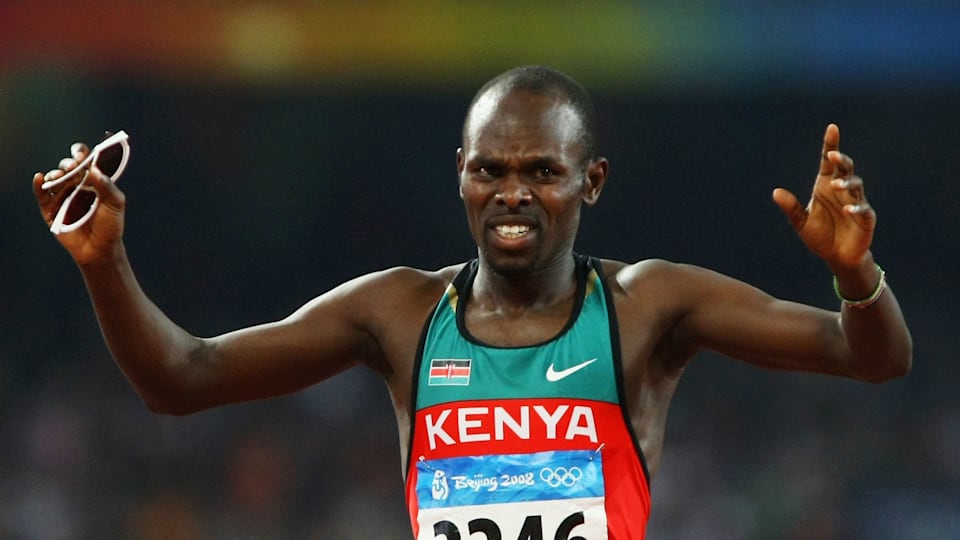Olympic champion Wilfred Bungei on alcoholism 'chaos' and near-death experiences
The Kenyan runner became an alcoholic after retiring and missed the birth of his child. Now, over seven years sober, he wants more support for athletes.

Wilfred Bungei seemed to have it all: An 800m Olympic gold medal, money, and status.
By 2010, the man who was born in Kenya and "shaped" by Verona in Italy had won everything he wanted in athletics and decided to hang up his spikes. However with few aims, and little support outside of his family, he turned to alcohol.
"It was the vacuum that I didn’t have much to do. Which happens to most disciplined athletes. When they are running their life is only running, you sleep, you travel around the world," Bungei told the Olympic Channel Podcast.
Bungei's drinking spiraled out of control. He would go on week-long drinking binges, almost losing his life at several points.
"If I start drinking I would drink for seven consecutive days, where I would down five litres of wine. If I had gin I would do a litre, just within a short time." - Bungei to Olympic Channel.
These binge-drinking sessions led to Bungei missing the birth of his child, which made him finally seek help.
The 38-year-old is now over seven years sober and sat down with Olympic Channel Podcast reporter Evelyn Watta in Kenya, to share his story in the hope of helping other alcoholics.
The 'chaos' of being an alcoholic
Bungei knew that rehabilitation was his only option if he wanted to see his kids grow up.
"There is only three destinations for an alcoholic: Institutions - which is treatment, you will go to jail because you will do something stupid that will put you in trouble, or you will die.
"As Wilfried Bungei, I’ve gone through the institution. What is remaining is jail and dead, and [they're] the two I’m not interested [in], and no one wants to be there. That is what reminds me and keeps me on the toes to realise that I have to live with this disease for the rest of my life, and the only way of not going to get in trouble is not going back to drinking.
"It was a chaos. It was not a good thing for my family, it was not a good thing for anyone that knew Wilfried Bungei and what I was about."
Bungei, who is now a motivational speaker, also highlights the lack of support many former Kenyan athletes also suffer from.
"We have a majority of us that are living in abject poverty, despite the fact that they won a lot of fame, they won money, they won medals, but it becomes a problem and I decided myself to come out on my own terms for one reason: I realised if I say my story, I may be able to change the life of a sports man or woman around the world."
Samuel Wanjiru's death was 'supposed to be me'
The death of friend and fellow Beijing gold medallist Samuel Wanjiru also played a major role in Bungei eventually becoming sober.
Marathon Olympic champion Wanjiru also had issues with alcohol, and had drunk with Bungei on occasion.
In 2011 Wanjiru died from a fall off a balcony at his home in Nyahururu - allegedly with a large amount of alcohol in his system - and the tragedy had a significant affect on Bungei.
"On the eve of the day that Samuel Wanjeru died I was hospitalised at three o'clock p.m.," Wanjiru revealed.
"In the morning someone was knocking on my door and the only news they were giving me is Samuel has gone. I cried because of one reason: I believed that it was not Wanjiru who was supposed to die but me.
"At the hospital I was told I drunk a whole litre of vodka and I blacked out and my eyes had already rolled, they ran me to the hospital and put me on three drips and I was able to recover quickly.
So I always say someone like Samuel never even had a support system. If he had a family or a support network that realised he had a big problem of alcoholism, he would be here today with us.
Samuel WANJIRU
Entering rehabilitation
In May 2012, while driving under the influence, Bungei was involved in a serious car accident.
Miraculously he walked away unscathed, but was still suffering relapses with alcohol.
The tipping point finally came in November 2012 when he drunk for four consecutive days to a point his body couldn’t take it anymore.
“I was throwing up every single minute and no food could settle in my stomach,” he recalled of the day he turned the corner and finally checked into rehab.
His rehabilitation lasted six weeks.
Overcoming stigma
To beat alcoholism is a difficult enough task in itself. But in Kenya it is even harder due to public misconceptions, according to Bungei.
"Many people who are alcoholics, they are stigmatised," he said.
"So the moment when we accept these issues and we do not stigmatise, that will only allow for healing and we can win this war on drug abuse." - Bungei to Olympic Channel podcast
"These people need to be accepted in the society and we need to get the right treatment for these people so as a country... we need to play a bigger role than simply 'this person is drunk'.
"My business is to be able to share my story and hopefully I can genuinely save a life. I do not need to change 10 people who are alcoholics to leave alcohol. I just need to have one success story. That is what makes my life. "
Wilfred Bungei was this week’s guest on the Olympic Channel Podcast.
Each week we find athletes and speakers to talk about the biggest Olympic talking points.
